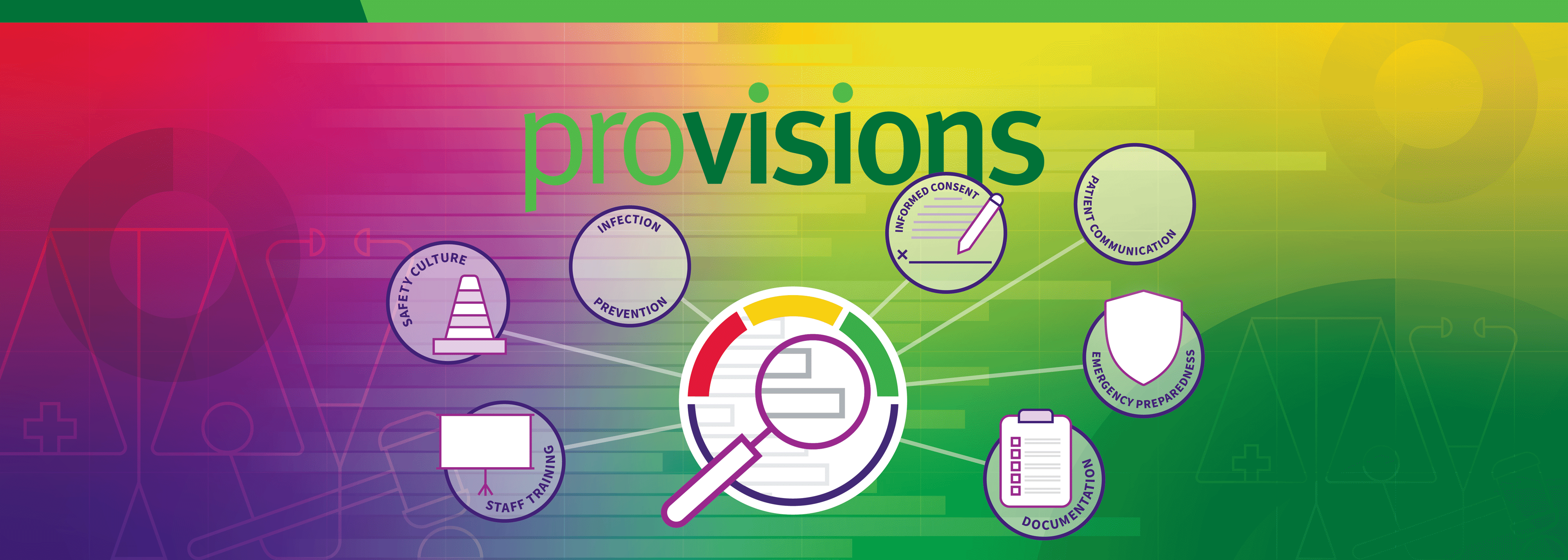
January 2024
The Annual Baseline Self-Assessment
Table of Contents
About Our Issue
Your clients now have a new option for earning their risk management premium credit with ProAssurance. We are pleased to formally introduce the Annual Baseline Self-Assessment (ABSA). The ABSA is a brief survey taken by the entire healthcare team at a medical practice (physicians included). The survey takes 15 minutes or less to complete, and the resulting data helps our Risk Management team identify gaps in knowledge so we can provide more customized educational opportunities to minimize liability risk.
This issue will outline how the ABSA process works, premium credit opportunities, the risk areas of focus within the ABSA, and more. We are providing you with this information in advance of our promotional campaign to your clients this spring so you can be well prepared to answer any questions they may have. We will continue to share more information and copies of our promotional materials as our campaign moves forward.
The annual Loss Prevention Seminar (LPS) will still be available as an option to earn risk management premium credit in 2024—as will the option to earn premium credit for CME participation for NORCAL insureds. Physician insureds are welcome to choose the ABSA or the LPS as their vehicle to earn premium credit based on which option best fits their needs. Of course, your clients are encouraged to participate in both programs as a learning opportunity, if they so choose. However, the premium credit will only be applied once. The 2024 LPS program will launch in March like in previous years. We will share the program details with you at that time.
If your clients would like to get started, the ABSA is available now. You can request an assessment on behalf of your clients here: https://www.surveymonkey.com/r/ABSAAgentPartner.
Many of you offered feedback as we developed the ABSA program. We appreciate your participation and are excited to work with you and your clients in the inaugural year of the program.
The Annual Baseline Self-Assessment
![]() The Annual Baseline Self-Assessment (ABSA) is a brief survey that can be completed by the entire healthcare team (physicians included) in a few short minutes. Questions focus on office processes related to medical liability. This approach promotes candid answers to help us identify gaps in knowledge. Aggregated results are then reviewed so that focused educational opportunities can address the gaps. With a better understanding of what puts a practice at risk, we can improve defensibility in the event of a claim.
The Annual Baseline Self-Assessment (ABSA) is a brief survey that can be completed by the entire healthcare team (physicians included) in a few short minutes. Questions focus on office processes related to medical liability. This approach promotes candid answers to help us identify gaps in knowledge. Aggregated results are then reviewed so that focused educational opportunities can address the gaps. With a better understanding of what puts a practice at risk, we can improve defensibility in the event of a claim.
Ultimately the ABSA helps our Risk Management team build relationships with our insureds—helping understand their day-to-day activities and work with them to mitigate risk. We want to partner with medical professionals to help them do what they do best. The ABSA not only helps us with those goals but will provide a level of detail we’ve never had before on the unique risk factors each practice is facing.
The survey is rolled out to the practice in a cyclical fashion:
- Schedule self-assessments for each team member.
- Assess liability risk management knowledge.
- Evaluate all responses to identify gaps.
- Provide results, feedback, and educational resources to the healthcare team.
The practice will provide one point of contact, usually the practice manager, to help facilitate the process. After setup, the contact will get a link to distribute that leads to the survey.
The assessment typically starts on a Monday and runs for two weeks. After that, the compiled data will go to a Risk Management consultant for review. The consultant will then prepare a report and compile any resources needed to address knowledge gaps. Practices can expect the report within 30 days of survey completion. The cycle repeats annually to align with policy renewal.
The ABSA is available now for any practices that would like to get started.
You can request the ABSA on behalf of your clients here: https://www.surveymonkey.com/r/ABSAAgentPartner
ProAssurance insureds can request the ABSA here: https://www.surveymonkey.com/r/PRAInsuredABSARequest
There is no need to sign in at ProAssurance.com to request the survey or see your results. All participating practices will receive a custom link to their survey, and a Risk Management consultant will work directly with the practice to share the results.
We will be doing a promotional campaign for the ABSA in March when the 2024 Loss Prevention Seminar is released. This campaign will outline the ABSA program and explain the premium credit opportunities available to your clients in 2024. We will share more with you as that campaign rolls out.
The immediate objective with the ABSA is to find and address current gaps within the individual practice, and there will be benchmarking benefits over time. The aggregate data will allow insureds to compare their practice to others based on specialty, location, group size, and more. The annual nature of the program will allow them to see progress over time.
Beginning in 2024 ProAssurance insureds will have two main vehicles for potential risk management premium credit:
- The annual Loss Prevention Seminar (LPS): A two-hour CME-based educational program; or participation in supplemental online courses (30 minutes to 1 hour each, depending on the course)
- The ABSA: A survey completed in 15 minutes or less per participant
Practices are welcomed and encouraged to participate in the ABSA even if they prefer to continue participating in the LPS program in 2024. Participation in the LPS or ABSA may qualify ProAssurance physicians for up to 5% premium credit with full participation. Premium credits are subject to approval by the state insurance department and are applied at policy renewal.
ABSA vs. LPS
The ABSA will be available for potential premium credit alongside our traditional Loss Prevention Seminar (LPS). Physicians can choose the path to premium credit that best serves their needs. A risk management premium credit of up to 5% may be applied to either activity in 2024.
While physicians are welcome to participate in both activities, the risk management premium credit will be applied once.
Let’s compare each activity so you can assist your clients in taking advantage of the opportunity that best fits their needs.

ABSA
The Annual Baseline Self-Assessment is an online survey taken by a medical practice. The results are benchmarked, and the practice receives a customized report showing areas where they may be excelling and where there may be opportunities for improvement. Every person in a medical practice plays an integral role in healthcare delivery and each is included in the process by answering online survey questions. The questions are quick and easy to answer and focus on the primary drivers of medical malpractice risk. Participants’ responses are anonymous, and results are aggregated to provide a comprehensive picture of the practice. From physicians to nonphysicians, clinical and administrative staff, everyone has a role in identifying risk and improving patient safety. The assessment offers unparalleled opportunities for practices to see how they compare to their peers and similar practices.
LPS
The Loss Prevention Seminar is the ProAssurance Risk Management team’s annual program to offer insureds opportunities for CME and premium discounts. The theme for LPS changes every year. The 2024 program will focus on opioid prescribing and management. Over 20 states name opioids/narcotics/pain management as a required CME topic for medical license renewal. This program can be used to satisfy that requirement.
ABSA
The survey takes approximately 10 to 15 minutes for each individual to complete.
Risk Management Analytics and Data Quality Director Aaron Hamming says the ideal is to have every employee in the practice complete the survey and share their input. The goal is to have 80% or more of the people associated with the practice complete the survey. This has been the key to unlocking the best insights and actionable results.
LPS
The seminar takes about two hours to watch and is followed by a posttest that an individual must successfully complete to receive CME credit.
The Loss Prevention Seminar is typically broken up into categories, with a subject matter expert speaking between 15 and 20 minutes on their topic. Progress is saved as each section is completed so physicians do not have to watch the full program in one sitting.
ABSA
The ABSA is available now.
Request the ABSA on behalf of your clients here: https://www.surveymonkey.com/r/ABSAAgentPartner
ProAssurance insureds can request the ABSA here: https://www.surveymonkey.com/r/PRAInsuredABSARequest
Participating practices will receive a custom link to participate in the survey and will receive a report of their results from a Risk Management consultant.
LPS
The 2024 LPS program will launch in March.
Once available, insureds can sign in at ProAssurance.com and select “Physician Online Seminars” from the “Seminars” menu to gain access to the program.
ABSA
No. This program is not eligible for CME.
LPS
Yes. Physicians may earn up to two hours of CME commensurate with the extent of their participation in the activity.
Yes. Participation in either program may qualify physicians for up to 5% premium credit for participation in the activity as described. NORCAL insureds may also continue to earn the risk management premium credit by participating in CME activities.
However, insureds with policies on E&S, OBRA, most Certitude programs, and Wisconsin physicians who are not eligible for the Wisconsin Medical Society Member Benefit Program are not eligible to receive premium credit from these activities due to current rate structures.
The risk management premium credit may only be applied once, regardless of participation in ABSA, LPS, or CME programs.
Advancing Healthcare Excellence: ABSA’s Journey from 1.0 to 2.0
By Aaron Hamming, Director, Risk Management Analytics and Data Quality
The ever-evolving, complex healthcare industry requires development of new and updated risk management tools. Recognizing this, the Annual Baseline Self-Assessment (ABSA) was developed as a fully online, detailed medical practice assessment tool.
What We Learned from ABSA 1.0
ABSA 1.0, with its streamlined 22-question survey, made a profound impact over the course of two years. It offered simplicity yet insightful depth in evaluating medical practices. With responses from over 4,000 participants across more than 300 medical practices, this initial version highlighted several key opportunities for improvement. The responses provided a clear directive for focused improvements and reinforced the criticality of comprehensive risk management.
Some of those areas needing additional support were:
- Patient scheduling and follow up
- Enhancement of office practices
- Review of clinically important calls
- Response to protocol deviations
Going into 2024, ABSA 2.0 represents a significant evolution from its predecessor. This updated version is built upon the invaluable feedback from ABSA 1.0, with the aim to refine healthcare risk management further. The updates let us build on the unique and innovative first steps and lean into what provided the most value.
Notable Enhancements in ABSA 2.0
.
- Improved Data Segmentation and Benchmarking
- Tailored Specialty-Specific Content
- Enhanced Risk Reduction Strategies
ABSA 2.0 offers refined analysis based on practice size and specialty. This allows for more detailed benchmarking, aiding practices in evaluating their performance against similar entities. We can now organize the data based on factors such as a practice’s size in terms of the numbers of physicians, providers, and nonclinical staff; and in terms of the practice’s medical specialty. An example is a large family practice office, in which we can compare results against other family practices of a similar size locally, regionally, and even nationally to see how the office systems sit side by side.
Addressing the distinct challenges of various medical specialties, ABSA 2.0 introduces customized questions for each specialty, ensuring a more targeted and relevant assessment. We recognize that the risks and challenges faced by medical specialties are unique. To account for this, physicians and providers are asked questions that are tailored to the unique risks of that specialty. For example, ob-gyn providers are asked about risk management issues around birthing plans. Several specialty-specific modules are already in service, with additional modules being rolled out throughout 2024.
The ABSA 2.0 provides more in-depth risk reduction strategies tailored to the unique profiles of each practice and is accompanied by comprehensive resources and support. The increased detail in the assessment approach allows more insight into a medical office’s or practice’s risk profile. In areas where the data might show opportunities for improvement, we include custom risk reduction strategies and links to additional information and resources.
The feedback on these updates has been overwhelmingly positive, reflecting their effectiveness and relevance. Almost 89% of participants have agreed or strongly agreed that the content in ABSA 2.0 covers vital aspects of risk management, affirming its value in the healthcare sector.
As we embrace this new era of healthcare excellence with ABSA 2.0, ProAssurance Risk Management remains committed to supporting medical practices in their pursuit of higher standards of care and patient safety.

Risk Management Education for Risk Hotspots
The ABSA survey is designed to hone in on common hotspots of liability risk. If a practice has concerns in a particular area, the Risk Management team can develop customized recommendations for the group. Below is a list of samples of risk management tools and learning opportunities that align with the content of the ABSA. New resources will be developed based on what we learn from the aggregate survey data as the ABSA rolls out to insureds.
![]()
The practice has a complete tracking system for diagnostic procedures that encompasses centralized communication and documentation of physician orders, streamlined scheduling, efficient test performance, prompt results, physician notification, and patient communication.
Resource: Tracking systems do not have to be complex or expensive. In the absence of an electronic tracking system, use logbooks and card files.
Sample log: https://www.proassurance.com/link/84706b71b73c4b86814fdd9ba3c2bfd9.aspx
The practice provides clear and timely communication to empower patients with information, promote adherence to treatment plans, and strengthen the patient-provider relationship, contributing to a more effective and patient-centered healthcare experience.
Resource: Consider using a communication skills checklist to enhance patient encounters.
The provider maintains a well-documented medical record that reflects all clinically relevant aspects of the patient’s health, including a clear, timely, and accurate record of all patient and provider communications to ensure a comprehensive patient record.
Providers obtain patient agreement for medical procedures, fostering transparency in healthcare decision-making. Patients receive information and ask questions about recommended treatments to make well-considered decisions about care.
Infection prevention emphasizes protocols to minimize the risk of healthcare-associated infections, promoting a safe clinical environment.
Resource: https://youtu.be/iqXAb51lOJQ
Emergency preparedness addresses strategies for swift response and management of unexpected medical and critical situations such as natural disasters, fires, and security threats.
Resources:
Practice staff receives ongoing education to enhance skills and awareness of safety protocols, as a strong protection against a medical professional liability claim and to contribute to the success of a practice.
Content Examples:
“Multiple External Non-Medical Factors Complicate Claim of Inadequate Staffing” (Vital Signs)
Closed Claim Case Allegation: The lawsuit alleged the insured facility failed to provide adequate staffing, care plans, and fall prevention measures for the resident who was at a high risk for falls; an alleged medication error could also have led to a fall.
“Employee Awareness Is Critical in Defending Against Ransomware Attacks” (Practice Resource Library)
In the digital practice—where sensitive business and patient information is stored electronically—ransomware is one of the most devastating forms of malware. It works by encrypting or blocking access to sensitive files and demanding payment to restore access. If the attack is successful, it is nearly impossible to recover the data without paying the ransom, and even paying it does not guarantee restoration of access. The loss to a healthcare practice—and its patients if medical records access is blocked—could be devastating.
“Ineffective Staff Training and Procedures Alleged in Allergy-Related Death of Child” (Practice Resource Library)
Educating staff members about emergency policies and evaluating emergency clinical skills are critical components in helping reduce the risk of malpractice claims.
The practice evaluates and optimizes the delivery of healthcare offerings.
Content Examples:
“Clinical Use of mHealth Lags Consumer Adoption” (Practice Resource Library)
A 2023 survey found that more than a third of U.S. adults—40%—use health apps to achieve fitness goals and track their health, an increase of 6% since 2018, while 35% use wearables, an increase of 8% since 2018. On the clinical side, roughly a third of physicians, residents, and medical students believe data from consumer health apps and wearables—aka, mHealth—can be very beneficial to patients, but they also feel largely unprepared to use such tools in practice.
“Understanding the Risks Associated with Medical Directorships” (Practice Resource Library)
A medical directorship may seem like a reasonable way to bring in extra income without investing a lot of time and effort. However, depending on the arrangements, a medical director’s duties can be extensive and the liability issues not always obvious. Therefore, it is important to understand the legal, regulatory, and professional liability coverage issues prior to accepting a medical director position.
“Helping Non-compliant Patients Overcome Barriers to Adherence” (Practice Resource Library)
Non-compliant patients are among the stressors that can result in physician burnout. The cause of noncompliance varies from patient to patient and often depends on the complexity of their situation and their ability to comply.
The practice emphasizes fostering a workplace environment prioritizing patient and staff well-being.
Content Examples:
“Manage Challenging Patients to Reduce Physician Burnout” (Practice Resource Library)
Alone or in combination, various patient, physician, and healthcare environment issues can contribute to patients being perceived as difficult. Physician burnout can increase the incidence of challenging patient encounters, as well as result from these encounters. Reducing physician burnout stressors and the factors contributing to these perceived difficult encounters could help mitigate both.
“Preventing Surgical Never Events - Case Studies and Best Practices” (Practice Resource Library)
The term never event was coined in 2001 to describe medical errors that should never happen. The National Quality Forum (NQF) now lists 29 types of never events (also referred to as “serious reportable events” by NQF and “sentinel events” by The Joint Commission). The case studies address examples of surgical adverse incidents that would be considered never events: retained surgical items, surgical fires, and wrong-site surgery.
“Opioid Prescribing for Chronic Pain: Case Studies and Best Practices” (Practice Resource Library)
More than 68,000 Americans died of opioid-involved overdoses in 2020—a 37.6% increase over 2019, and the largest yearly increase in opioid-involved overdose deaths in two decades. A total of 16,416 (23.9%) of those deaths involved prescription opioids. Approximately 21% to 29% of patients prescribed opioids for chronic pain misuse them, and between 8% and 12% of patients prescribed opioids for chronic pain will develop an opioid use disorder (OUD). It is no surprise, then, that overdose death involving opioids is referred to as “a public health emergency” and an epidemic.

Americans Less Satisfied with Almost Every Part of the Health System
Americans' satisfaction with almost every major part of the healthcare system has dropped since 2010, according to a new Gallup analysis.
Driving the news: Drugmakers took the biggest reputational hit, and ratings for physicians fell sharply, too.
The big picture: COVID-19, ballooning costs, an opioid crisis, and other factors could contribute to Americans' souring sentiment, Gallup says. The findings also suggest that the goodwill Americans felt toward doctors at the start of the pandemic has all but disappeared.
Of note: Americans are happiest with the care they received from nurses, with 82% rating the care as excellent or good—down 6 percentage points from 2010.
Read the article.
Source: Axios

These attitudes mirror what we are seeing in our cases. Patients expect more and more from their healthcare providers and seem ready to pounce if they do not get what they want. Unfortunately, the frustrations of daily life have affected patient relationships with healthcare providers.

In my experience, my relationship or lack thereof with a healthcare provider or entity impacts my perception of them significantly. If I feel like they are not really seeing me as a person, then I am going to feel less well cared for. I think this is a natural human reaction, and it seems to show in the data.

The data shown in the article is not surprising. Over the last few years following COVID, it has become difficult to book appointments. I have had friends tell me that they have experienced poor bedside manners from physicians and nurses. I also have personal experience having trouble filling prescriptions because they are out or there are many hoops to jump through. It is fascinating how much we are still recovering from the height of COVID.
.png?width=300&name=MicrosoftTeams-image%20(28).png)
Physicians Practice averaged each state’s ranking in six criteria for their annual list:
- Cost of living
- Physician density
- Amount of state business tax collected
- Cost of medical malpractice rates
- Quality of life
- Geographic Practice Cost Indices (GPCI)
The GPCI was used to break any ties. (Physicians Practice)
Read more →
Federal officials have unveiled a new strategy to address rising cybersecurity incidents. It includes incentives to improve data security, beefed-up guidelines, and the potential for cuts in reimbursement. (Health Leaders Media)
A new CMS rule aiming to streamline Medicare Advantage and Part D prior authorizations took effect January 1. CMS issued the final rule in April. It requires that coordinated care plan prior authorization policies may only be used to confirm the presence of diagnoses or other medical criteria and/or ensure that an item or service is medically necessary, according to a CMS fact sheet. (Becker’s Payer Issues)
The Occupational Information Network, part of the U.S. Labor Department, has ranked 873 of the most stressful jobs in the nation. The list—which spans all industries, not just healthcare—considers professions which require employees to accept criticism and deal calmly and effectively with high-stress situations. (Becker’s Hospital Review)
One-third of academic physicians have at least a moderate intention to leave their facility in the next two years, driven by burnout and a lack of professional fulfillment, a study published in JAMA Network Open found. High physician turnover exacerbates staffing shortages and disrupts patient care. Physician well-being is a key consideration when it comes to improving retention and minimizing attrition. (Rev Cycle Intelligence)
Federal antitrust agencies finalized stricter guidelines for mergers and acquisitions in December that could make it more difficult for healthcare deals to close. The guidelines lay out a framework that the Department of Justice and Federal Trade Commission use when reviewing proposed deals and that the courts can reference in overseeing challenges. However, the guidelines are not legally binding themselves. (Healthcare Dive)

Change Starts with Trust

When I began my career as a perpetually cheerful and enthusiastic medical sales rep, I couldn't understand why physicians and other HCPs weren't always happy to see me. In my mind, I represented products to improve patient outcomes and make things easier for surgeons. I quickly discovered that I also represented something physicians instinctively shy away from—change.
While salespeople thrive on the benefits of change, HCPs seem to have an allergy to it. Clinicians spend every moment of their day relying on proven, time-tested treatments and procedures for their patients. Deviating from this practice introduces some perceived risk in that something new or different might yield inferior results or even harm the patient. This risk thinking spills over even to nonclinical considerations—such as changing their MPL insurance provider.
It took me a while to learn that when it comes to physicians, change isn't so much about offering a better product; it's more about building trust. Before considering different products or companies, they need to trust the seller.
Medical sales reps typically pitch a one-size-fits-all option that varies only by the amount of time a prospect gives them. The drawback to this approach is that it shows more interest in getting the sale than understanding the client and their needs. Assuming all HCPs are the same doesn't build trust.
The Path to Trust: Personalization
What's the secret to building trust? Demonstrating integrity is crucial, but personalizing the sales conversation to show respect for the prospect’s individuality is also essential. It requires being a good listener and showing you know what's important to them by including it in the conversation.
I had been pitching hip and knee products to Dr. George, a high-volume joint replacement surgeon, for over nine years. He had every ortho rep in town swooning over him, but he never changed implant systems.
Dr. George was a triathlete, something I didn't fully grasp since the idea of swimming a mile, biking 100 miles, and running a marathon back-to-back was beyond my imagination. Curious, I asked the doctor about it, specifically why triathlons appealed to him. He said he enjoyed the challenge of improving his training technique or conditioning to shave some time off his personal best triathlon finish. He said placing or not placing in a competition was often a matter of seconds.
One day I mustered the courage to invite Dr. George to dinner. I asked him the million-dollar question: Why wasn't he willing to give a different hip or knee system a spin? His response? He felt there weren't enough differences between systems to justify the learning curve. I pointed out how he constantly tweaked and changed his training and diet to gain a nominal improvement in his triathlon time, parroting his sentiment that subtle changes made a difference. He agreed. I then asked him if he believed that small design changes in a hip or knee system might provide significant improvements for his patients. He laughed and said, "Fair enough. I'll evaluate your knee system. I trust you because you understand me."
Inspiring change isn't merely about offering a revolutionary product. It's about genuine connection, sincere interest, and unwavering commitment to the client's world in order to build trust. The more physicians and other HCPs trust you, the lower their resistance to changes you propose. In healthcare, trust is the lubricant that smooths the gears of change.

|
Written by Mace Horoff of Medical Sales Performance. Mace Horoff is a representative of Sales Pilot. He helps sales teams and individual representatives who sell medical devices, pharmaceuticals, biotechnology, healthcare services, and other healthcare-related products to sell more and earn more by employing a specialized healthcare system. Have a topic you’d like to see covered? Email your suggestions to AskMarketing@ProAssurance.com. |










